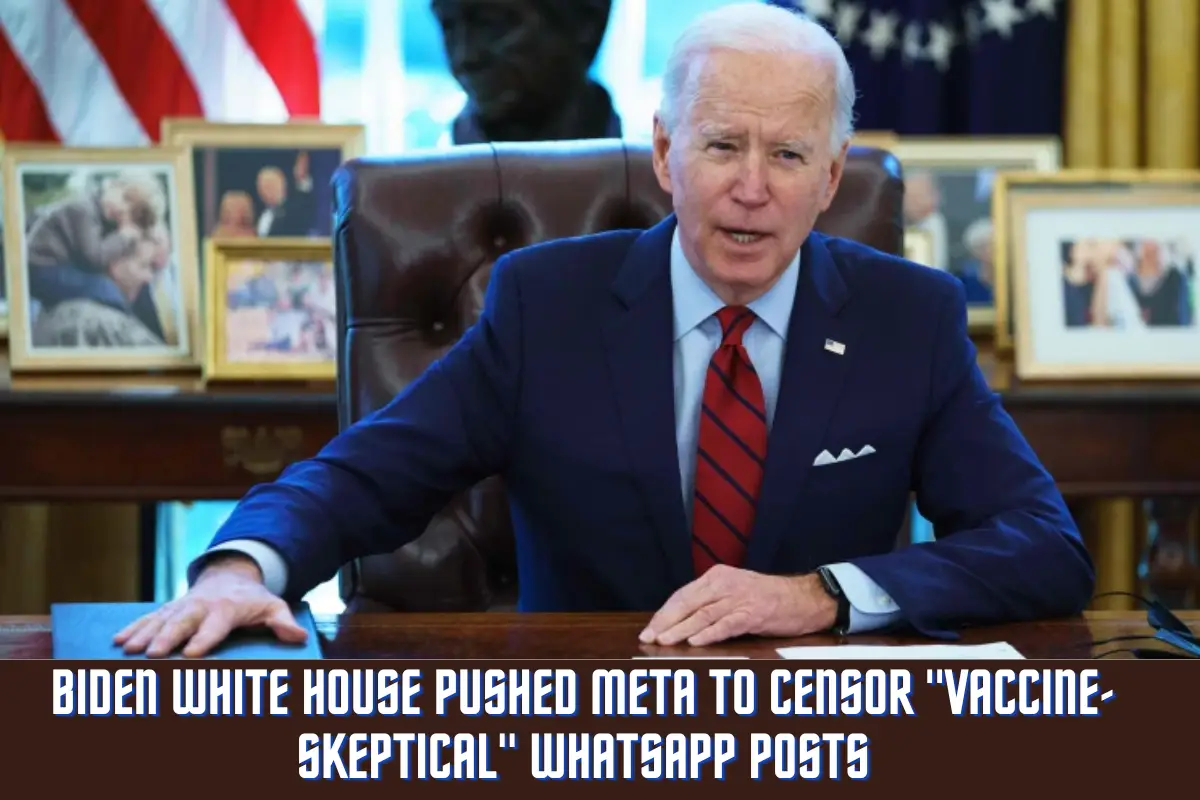Recently declassified emails suggest that the Biden administration attempted to curb the spread of “vaccine-skeptical” information on the encrypted messaging service WhatsApp.
According to a story by freelance journalist David Zweig published on Friday, the White House took action beyond Twitter to censor tweets mentioning the COVID virus.
White House emails to the computer behemoth were already being sent days after President Biden entered office, according to discovery emails uncovered in the current Missouri v. Biden legal dispute.
Quoting Meta, Zweig emphasized that WhatsApp is an encrypted direct messaging medium, unlike Facebook and Instagram, both of which are owned by Meta.”90% of WhatsApp messages are from one person to another. And groups typically have fewer than 10 people.”
White House director of digital strategy Rob Flaherty demanded in a March 2021 email that Meta executives demonstrate how they were “tracking reduction of harm” on WhatsApp, arguing that they needed a “proper mousetrap” to monitor the encrypted data being transmitted over WhatsApp.
Andrew Slavitt, who was a senior adviser on COVID at the White House at the time, was another resource Flaherty gave Meta, saying he was “ready to talk on the phone” with her “a couple of times per week if [it] is required.”
“Because of WhatsApp’s structure, targeted suppression or censorship of certain information did not appear possible. Instead, much of the aim of the content moderation on WhatsApp, therefore, was to ‘push’ information to users,” Zweig authored. “The service partnered with the World Health Organization, UNICEF, and more than 100 governments and health ministries to send Covid-19 updates and vaccine-related messages to users. The company created initiatives such as a WhatsApp chatbot in Spanish to aid in making local vaccination appointments.”
Some days after their initial email exchange, Flaherty once again pressed Meta on the topic of content moderation on WhatsApp.

He was informed that “content-agnostic product interventions” would be Meta’s only method of moderation, and that this method would primarily focus on messages “that didn’t originate from a close contact” because these messages “were more likely to contain misinformation” and would lead to a decrease in “forwards” for the platform.
“In one of the follow up exchanges, Flaherty seemed dissatisfied with the response, and again pressed Meta to take action on vaccine hesitancy,” As reported by Zweig.
His letter’s focus: is on the steps being taken to prevent further escalation of the vaccination reluctance crisis in the United States. Despite your best efforts, “I still don’t have a strong, scientific response on how effective you have been in reducing the transmission of vaccine-skeptical content and misinformation among vaccine fence sitters.”
Biden White House urged Meta to crack down on ‘vaccine-skeptical’ content on WhatsApp private chat platform https://t.co/ljXkxBdLy6
— Fox News (@FoxNews) March 24, 2023
Flaherty suggested in the email that he doesn’t want the same relaxed approach to content regulation on WhatsApp because Facebook didn’t apply an “algorithmic change” in election-related content to prevent the Jan. 6 “insurrection” from being plotted on the site.
“Flaherty wanted empirical data about the effectiveness of reducing ‘vaccine-skeptical content’ on a platform composed of non-public messages. He wanted supposed misinformation on a private messaging app to be ‘under control.’ What, exactly, was he hoping to get Meta to do?” Zweig published. “It was obvious from the start that WhatsApp’s interface didn’t allow for the granular control Flaherty appeared to desire. And his smiley face response suggests he well understood this. Yet he kept badgering the Meta executives anyway.”
Keeping going, Zweig “The exchanges about WhatsApp are arresting not because of what Meta ultimately did or did not do on the platform—since the company’s options for intervention appear to be limited—but because efforts to moderate content on a private messaging service was a continued interest for a White House official at all… Fortunately, targeted censorship on a private messaging app is still out of government reach.”
